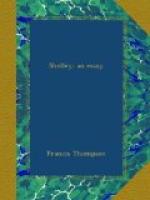There is a change of late years: the Wanderer is being called to her Father’s house, but we would have the call yet louder, we would have the proffered welcome more unstinted. There are still stray remnants of the old intolerant distrust. It is still possible for even a French historian of the Church to enumerate among the articles cast upon Savonarola’s famous pile, poesies erotiques, tant des anciens que des modernes, livres impies ou corrupteurs, Ovide, Tibulle, Properce, pour ne nommer que les plus connus, Dante, Petrarque, Boccace, tous ces auteurs Italiens qui deja souillaient les ames et ruinaient les moeurs, en creant ou perfectionnant la langue. {2} Blameworthy carelessness at the least, which can class the Vita Nuova with the Ars Amandi and the Decameron! And among many English Catholics the spirit of poetry is still often received with a restricted Puritanical greeting, rather than with the traditionally Catholic joyous openness.
We ask, therefore, for a larger interest, not in purely Catholic poetry, but in poetry generally, poetry in its widest sense. With few exceptions, whatsoever in our best poets is great and good to the non-Catholic, is great and good also to the Catholic; and though Faber threw his edition of Shelley into the fire and never regretted the act; though, moreover, Shelley is so little read among us that we can still tolerate in our Churches the religious parody which Faber should have thrown after his three-volumed Shelley; {3}—in spite of this, we are not disposed to number among such exceptions that straying spirit of light.
* * * * *




